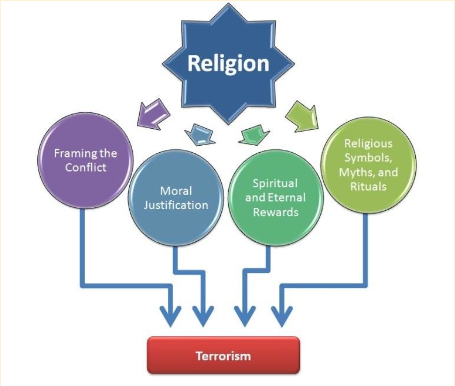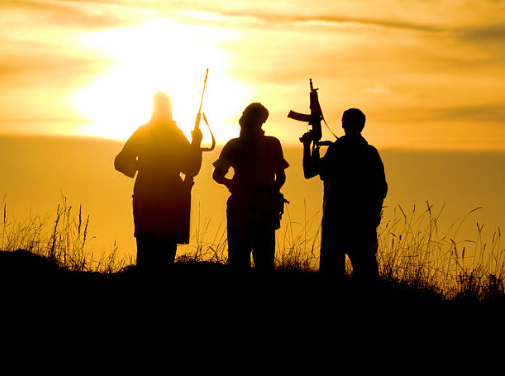INTRODUCTION
‘Terrorism’ is derived from the Latin words “terrere” and “deterre”.The word “terrere” means “tremble”, and the term “deterre” implies “frighten”. Terrorist attacks are characterized first and foremost by the use of physical coercion. This tactic of violence takes many forms and often indiscriminately targets the non-combats, the purpose for which it is used and its root causes, are where most disagreements about this phenomenon begin.
Historically the term describes the state violence against citizens during the French Revolution (1789-99). Over the past half-century, however, it has come to meet the use of coercion by small groups aiming to achieve political change. Today, it has been understood as a strategy to achieve political gains using violence while actively undermining the state’s authorities putting national security at risk.
Post-September 11, 2001 attacks, international terrorism underwent tactical changes, becoming more diffused and widespread. The terrorist acts were universally condemned. It marked a turning point in history with all nations together joining to formulate a collective response in what came to be known as the “Global War on Terrorism”.
TYPES OF TERRORISM–
International Terrorism is of varied types based on their motivation and their resource mobilization. Here, are a few of them-
- State-sponsored- In this case, the state as an authority supports the groups engaged in terrorizing through violence. The governments directly or indirectly assist these groups in getting more resources for spreading this terror.
- Right/Left Wing Inclination- This radicalization is deeply rooted in the political ideologies of terrorist groups. Originating from the seating arrangement of the French Assembly in 1789, the two spectrums range from right-wing conservatism to left-wing communism. However, there is no single definition of this today. It has evolved over time post-Renaissance, declining role of the State, Industrialization to a globalizing borderless world today. These terrorist attacks are oriented towards establishing their regime in power.
- Religious Terrorism– This type is fundamentally motivated by the belief that one religion is supreme and therefore advocates forceful physical coercion to secure that hegemony. The increasing trend of such terrorist attacks has led to the decline of principles like secularism and fraternity in civic society.
Global terrorism– Today, the world has become a global village and probably borderless. The easy flow of people, goods, and services from one part of the world to another has made transport and communication very easy. This same phenomenon of globalization has put the national security of governments at stake exposing them to even bigger threats of global terrorism, which is not just limited to an area or region anymore. It has made the availability of arms and ammunition very easy.

CAUSES OF INTERNATIONAL TERRORISM-
Scholars have struggled to definitively pinpoint the reasons behind terrorism but research has suggested three potential causes of international terrorism: domestic political instability, failed states, and ideological and psychological influences.
The first is political instability which arises from civil wars and inter-state conflicts. Countries with low levels of political and economic development are more prone to domestic instability, providing fertile ground for armament. State-sponsored terrorism can emerge as a result of anti-government demonstrations, guerrilla warfare, armed revolutions, and general strikes motivating physical harm in the form of terrorism.
Another factor is failed states, characterized by conflict, political instability, human rights abuses, and high levels of violence. Weak states that struggle to address grievances and maintain control over their territories create an environment conducive to the escalation of terrorism. Since the September 11 attacks, these weak states have been identified as threats to the national security of countries worldwide.
Ideological and psychological influences also play a significant role. Certain acts of militancy and religious radicalization are influenced by an individual’s moral values and abilities to comprehend the world. These factors create a sense of community and political purpose among them. Radical Islamist propaganda and global events like the US intervention in the Middle East have motivated individuals to carry out terrorist activities in their home countries even without direct affiliations with established terrorist groups.
WAYS TO COMBAT INTERNATIONAL TERRORISM–

International terrorism, regardless of nationality or religion, poses a direct threat to people’s lives and security, as well as hinders global peace, national security stability, and human rights. Combating the complex phenomena of terrorism requires solidarity among nations, and several measures have been implemented:
Following the September 11, 2001 attacks, NATO invoked its collective defence clause (Article 5) for the first and only time in response to the terrorist attacks against the United States.
Security Council resolution 1373 (2001) was adopted, which addresses counter-terrorism measures that also affect the enjoyment of human rights.
The United Nations Global Counter-Terrorism Strategy, adopted by the General Assembly in 2006, highlights the importance of addressing underlying factors that can contribute to terrorism, such as unresolved conflicts, dehumanization of victims, discrimination, human rights violations, and lack of good governance.
The need for bilateral and multilateral agencies to share their expertise and provide technical assistance to countries in drafting national laws, training prosecutors and judges, and connecting national databases to border posts.
It is crucial to enhance preparedness and response capabilities to any form of terrorist threats and radicalization. Potential targets should be analyzed to assess risks, and security measures should be strengthened in high-risk areas. Specialized units should receive training in tactical field combat, including sniper courses, counterterrorism operations in urban environments, and operations to dismantle terrorist camps. Coordination and cooperation with neighboring countries facilitate the exchange of best practices in combating terrorism.
In this endeavor, the United Nations should provide guidance and support to help countries develop comprehensive national strategies that integrate stringent security measures with socio-economic and community-driven policies based on the rule of law.
-Bhawini Srivastava
Must Read: TRIUMPH OF EDUCATION: SKCF’s STUDENTS DEFY THE ODDS


